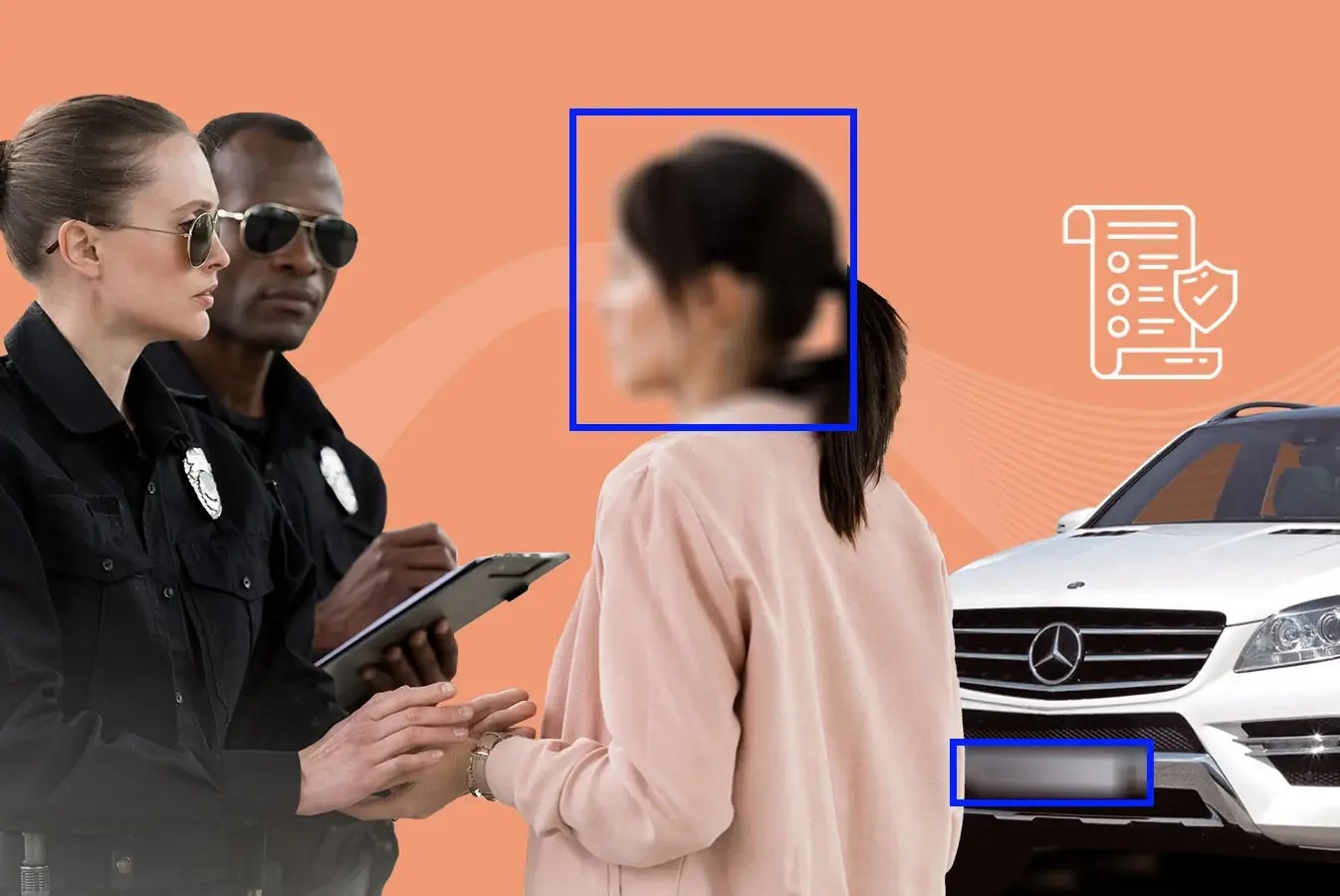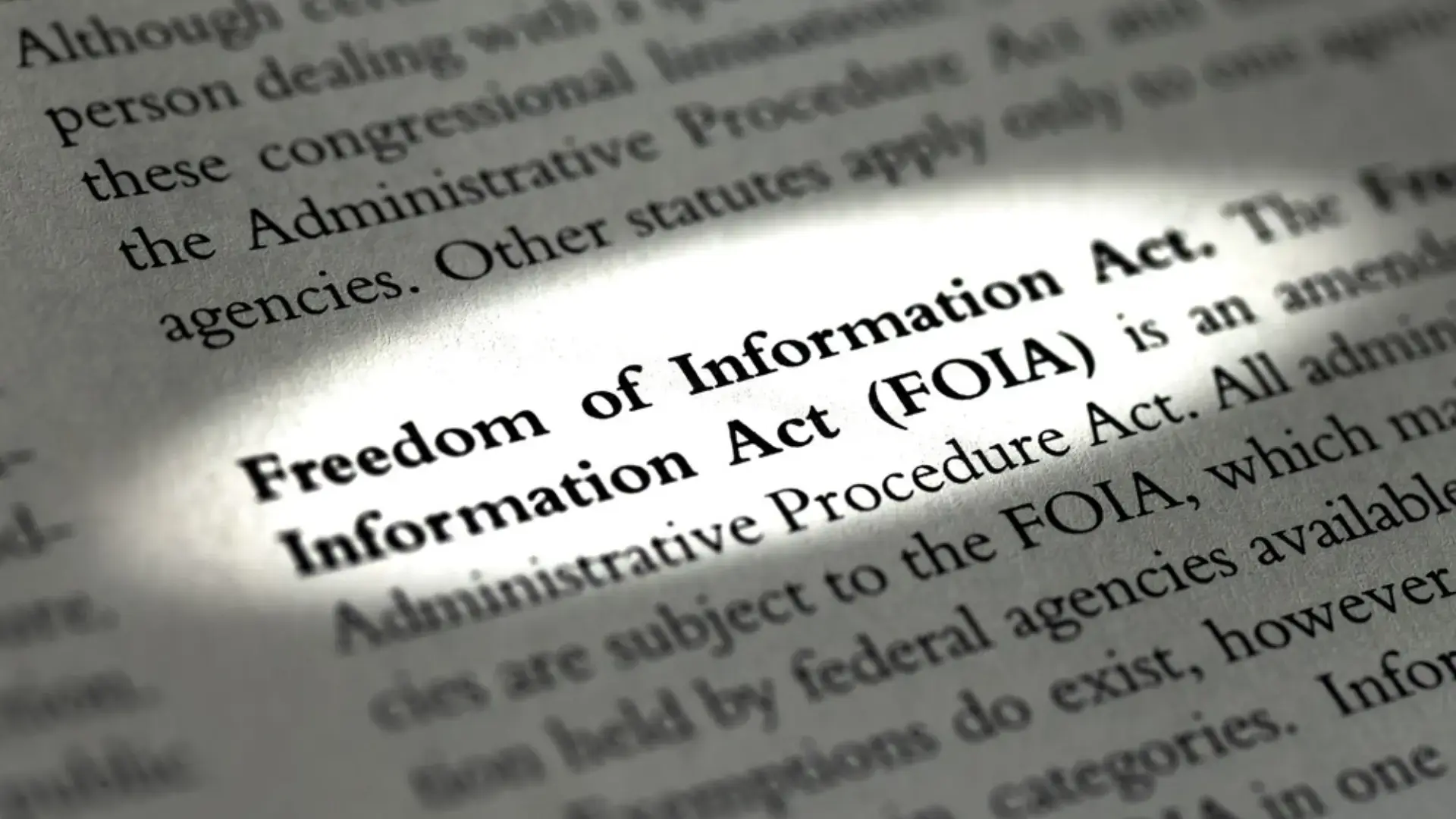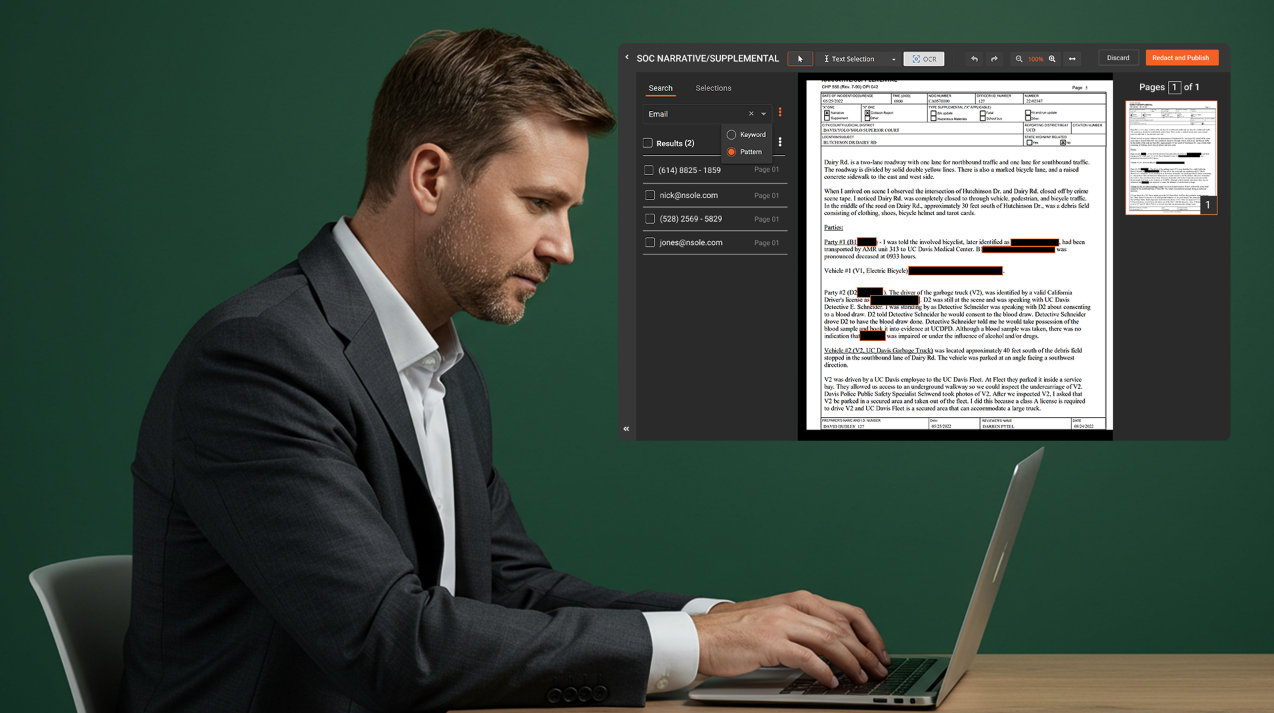Using Redaction Software to Reduce Mistakes in Police Documents
by VIDIZMO Team, Last updated: November 18, 2025, ref:

Changing font color and highlighting the confidential content with black box has been a popular redaction practice for a long time.
The question is whether it is a reliable redaction technique.
The simple answer is no.
It would only take someone, somewhere, a few clicks to reverse your redactions and restore the redacted text from your document, leading to costly redaction failures.
So why do people still rely on such obsolete redaction methods?
It’s because they still consider redaction a difficult thing to master.
This is, however, the biggest myth associated with redaction. People fail to redact their documents properly because they don’t follow the best practices for document redaction.
Thanks to the unprecedented advancements in AI over recent years, redaction has become easier than ever.
You can now redact your files swiftly with automated redaction workflows.
Just make sure you’re relying on the right software. It should offer optimum security for your data, encryption, and other features that empower you to ensure data integrity.
This blog aims to cover the common mistakes and pitfalls when redacting police records and other documents.
Why Police Departments Need Redaction
The police need redaction the most.
Whether it's to meet the ever-growing demand for public information requests through FOIA or to ensure compliance with DOJ and OMB mandates, the US police deal with loads of documents regularly, ensuring they balance transparency and confidentiality.
The best possible way to meet these compliances is to redact documents before sharing and storing them in a safe space.
Considering the scenario of sharing juvenile information. Sharing information about cases involving juveniles without taking necessary security measures may put you in a lot of trouble.
There are specific juvenile information-sharing (JIS) guidelines in the US that you must always follow. These guidelines include protocols for effective collaboration, confidentiality, and technology.
While your data needs to be accessible to relevant authorities from multiple locations, it should also be secure. Besides, you must also be able to hide specific information when responding to FOIA requests.
The primary reason why confidentiality has become a growing concern for the US police is the increasing number of cybercrimes in the country.
Data breaches are rising at a greater pace than ever, and the trend is only expected to grow in the upcoming years. The police deal with loads of data involving people’s personally identifiable information (PII). This is why police record redaction becomes a necessity.
Unlike popular opinion, police are also a victim of cybercrimes. Hackers generally target them to steal critical policing data such as witness identities.
Considering the continuing threat, the police need to ensure they’re not just securely storing this information but also accurately redacting an individual’s PII when sharing it for transparency.
Document Redaction Mistakes and Pitfalls
Let’s look at some common mistakes and pitfalls when redacting documents.

Use of Unreliable Technology
Technology is advancing unprecedentedly, and so should your police department’s IT infrastructure. If not, it may lead to far-reaching consequences.
While the right use of technology is critical to expedite your administrative tasks, staying one step ahead of cyber-criminals is also important. The use of outdated technology limits your ability to respond promptly to your organization's growing privacy needs in this dynamic age.
Worse yet, unreliable technology in public safety and law enforcement agencies can have a crippling impact on your reputation.
If you use unreliable redaction software, cybercrooks will easily gain access to your storage systems, tampering with evidence without your knowledge.
An advanced redaction software for police allows you to securely store your evidence and redacted documents and have complete control over the platform’s accessibility. It also supports audit trails to ensure data integrity.
Relying on Manual Redaction
Imagine receiving a FOIA request.
The requester demonstrates that as a ‘compelling need.’
You have loads of documents regarding the request, all containing confidential information every now and then.
Limited time, urgent deadline, loads of data. So, what will be your next step?
Will you sweep through the massive data piles to ensure the data is safe to share?
If we lived in an older era, the answer would be certainly affirmative.
But thanks to AI, things have become significantly easier today, and relying on manual police records and redaction practices would only harm you and your police department.
Redacting confidential documents manually can take ages. There will also be a considerable risk of human error. Therefore, you should consider purchasing advanced redaction software for your police department. It will also serve as the catalyst for your department’s compliance plan.
Lack of understanding of privacy laws
The year 2023 marks the start of a new era in terms of data privacy in the US. The previous ‘harm-preventions-approach’ has been replaced with the broader ‘right-based approach, inspired by the European Union's General Data Protection Regulation (GDPR).
Now, individuals have the legal right over their personal information, i.e., the right to know who can control it and who uses it, and why. Police departments need to stay on top of new privacy regulations to ensure compliance.
Some critical compliances for police departments include FIPS (Federal Information Processing Standards), DOD, etc.
It's important for all police departments to ensure adherence to legal and privacy obligations to safeguard sensitive information, protect individual rights, and maintain their credibility.
The repercussions of non-compliance can be serious, leading to financial penalties, legal actions, and reputational damage. This is why police record redaction is a challenging endeavor.
Lack of clear understanding of legal redaction requirements may result in non-compliance. Therefore, there’s an increasing need for agencies to deploy a compliant redaction system that seamlessly integrates with their existing software and effectively performs police records redaction.
Neglecting Audit Trails
Collaboration is key to effective policing. But is that secure?
Well, the answer heavily depends on how you effectively manage these collaborations.
Interagency collaboration can multiply your efficiency and performance tenfold —building safer communities, thereby enhancing overall societal well-being.
While accurate information sharing between departments is important for better performance, it's inevitable to maintain an adequate chain of custody for all evidence.
Having a meticulous record of every move made with your redacted files – who accessed them and exactly when isn’t only about securing data; it's primarily about upholding data integrity, which is the core of your profession.
Accountability in police isn’t just a buzzword; it’s a badge of honor. When every step taken with your evidence is recorded, it fosters an environment of responsible action.
Securing Tomorrow, Today
As we learn about redaction's intricacies, one truth remains resoundingly clear – the process of safeguarding sensitive information is a multifaceted endeavor. The journey from erroneous redactions to preserving data integrity unveils a world where precision, accountability, and state-of-the-art technology converge.
In a digital landscape teeming with threats and challenges, there's a core player in upholding privacy: VIDIZMO's AI-powered Redactor for documents.
With a commitment to excellence and cutting-edge solutions, VIDIZMO Redactor empowers police departments to confidently redact police records and other documents and avoid mistakes and pitfalls. From ensuring privacy through advanced AI to unearthing the risks of overlooking audit trails, the VIDIZMO Redactor is the ultimate tool to protect data and preserve the truth.
Why Police Departments Choose VIDIZMO Redactor
VIDIZMO Redactor helps police departments elevate the redaction processes, bolster accountability, and embrace the power of advanced AI-driven tools. Secure tomorrow with the innovation of today – explore VIDIZMO’s AI-powered Redactor now and witness a future where data integrity remains steadfast, untarnished by the pitfalls through the following capabilities:
- AI-powered redaction workflows to redact sensitive information
- Audit trails for logging every single activity happening with the redacted files
- Separate redacted copy to ensure that the original file remains intact
- Optical Character Recognition (OCR) to redact sensitive information in scanned documents and handwritten notes
- Pattern-based redaction to redact a chain of sensitive information, such as social security numbers (SSNs), credit card numbers, etc.
Get started with a 7-day free trial of VIDIZMO Redactor to experience effective redaction of police documents in action.
Embark on a Journey of Unwavering Trust. To learn more about VIDIZMO's AI-powered redaction solution, click here to learn more or visit our booth at IACP 2023 from October 14th-17th to learn how VIDIZMO's AI-powered Redactor can transform your workflow.
Jump to
You May Also Like
These Related Stories

What Is The Relationship Between Police & Redaction?

How Small Police Departments Can Reclaim 80% of Their FOIA Redaction Time


No Comments Yet
Let us know what you think